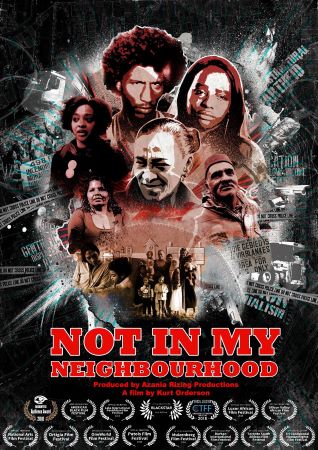
Not in My Neighbourhood 2018
Distributed by New Day Films, 350 North Water Street Unit 1-12, Newburgh, NY 12550; 888-367-9154
Produced by Najma Nuriddin, Raisa Cole, Jacqueline Ramos, and Kurt Orderson
Directed by Kurt Orderson
Streaming, 86 mins
College - General Adult
Activism; Political Science; Sociology
Date Entered: 03/29/2022
Reviewed by Brandon West, Social Sciences Librarian, State University of New York at GeneseoThere is an intergenerational crisis happening across the globe that stems from systemic violence and gentrification. These forces have devastating consequences for local communities and disproportionately affect people of color. People in these communities are often silenced, ignored, and bullied by the corporations, policies, and institutions seeking to oust them from their neighborhoods. This documentary strives to amplify the voices the people fighting to save their communities in the cities of Cape Town, Brooklyn, and São Paulo.
The documentary tells the stories of small groups of people existing within each city and shows how they are affected by corruption that is usurping them from their homes or how they are taking a stance against the violence they face. In Cape Town, the government is using insidious methods to evict residents of a low-income community in order to make way for expensive, contemporary housing complexes. One such tactic is to work with landlords to find ways to fine people with minor offenses then kick them out of their housing. The community in Flatbush Brooklyn is simultaneously fighting gentrification and trying to stop rampant police brutality against BIPOC individuals. In São Paulo, gentrification is pushing to impoverished people to the periphery of the city. Activist groups are working to reclaim over 200,000 vacant buildings for housing, which is leading to positive outcomes such as crime reduction. Though the regions span three continents, it’s notable how many of the forces that seek to gentry communities use the same tactics to forcibly uproot generations of people from their homes. By focusing on three separate cities, Director Orderson shows how people are more connected through their experiences than different from each other.
There is a striking energy to the film as it gives you the feeling of being on-the-ground with subjects. The effect is very impactful, as it helps the viewer to see the experience through the eyes of the people and helps us to see the beauty in the cultures they are being ripped from. The narrative also helps the viewer to understand that there is no easy way to stop systemic violence and gentrification–activism is the best shot at making a change. The film does not necessarily wrap up any of the narratives with a tidy bow. Rather, the viewer will be left to reflect on the messages in the film and hopefully find a way to make their own difference.
The themes of the film are only becoming increasingly topical with each passing day, which will appeal to a wide variety of audiences. The genre of the film spans a multitude of subjects, including sociology, political science, international relations, activism, and global issues. The film helps viewers better empathize with the people and communities and the film leaves space for meaningful discussion and research post viewing. Additionally, there are many other books and films that expand on the issues presented in the film. For these reasons, this film is recommended for library film collections.
Awards: Encounters Film Festival, Audience Award 2018; HBO American Black Film Festival, Best Documentary 2018; Africa International Film Festival, Jury Award Outstanding Film 2018
Published and licensed under the Creative Commons Attribution 4.0 license. Anyone can use these reviews, so long as they comply with the terms of the license.